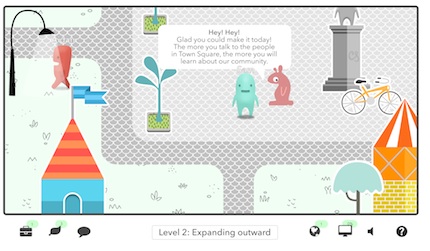Tufts U, Emerson Develop Video Game To Prepare Students for Community Service
Tufts University and Emerson College have developed a
multi-player, interactive, online video game designed to prepare college
students for community service and internships.
The video game,
Civic Seed, was created by educators and researchers at Tufts University's
Jonathan M. Tisch College of
Citizenship and Public Service in collaboration with the
Engagement Game Lab
(EGL) at Emerson College. Tufts University
students beta tested the video game for six months, and it is set to launch in
February 2014.
According to information from Tufts, Civic Seed is designed "for use by
classes and student groups who plan to do community service work or
community-based projects." It takes about two hours to complete and includes a
video clips from community partners, faculty and student interviews, whiteboard
animations and information graphics. The various game levels explore "community
collaboration, professional standards, sustainability, connecting academic
interest to career aspirations and leadership development," according to the
university. As students proceed through the game, they respond to questions that
form their "civic resume," which certifies their completion of the game.
“Student under-preparedness for working in communities is a pressing issue,"
said Mindy Nierenberg, senior student programs manager at Tisch College and
director of the leadership minor in Tufts School of Arts and Sciences, in a
prepared statement. "On many campuses, students begin participating in community
service and internships with little or no knowledge of the history, assets and
challenges of the community. These students may carry presumptions that are
destructive to the desired outcomes of working in the community."

As players explore and talk to the inhabitants of the world, they come to understand the community challenges faced by the characters. |
Nierenberg wrote the content of Civic Seed with input from students, faculty
and community partners at Tufts. Her team at the Tisch College originally
envisioned Civic Seed as an online learning tool, and they were "intrigued but
skeptical" when the EGL team proposed designing it as a video game. According to
Nierenberg, the creative tension between the two teams resulted in a better
final product.
According to information from Tufts, Tisch College is now developing a
self-paced, non-gaming online version of Civic Seed. When it's complete, the
team will test both versions to determine which one is more effective at
teaching civic engagement.
“Tufts students will be randomly assigned to either the interactive video
game or the self-paced non-game training," said Nierenberg in a prepared
statement. "Both groups will complete a pre- and post-test questionnaire that
will measure things like critical thinking, communication with diverse
populations, individual motivations and values and understanding the importance
of certain buildings and pieces of land in each community."
The researchers hypothesize that the video game will better prepare students
for community service.
Tisch College hopes to develop a version of Civic Seed for use by any
educational institution by late 2014.
About the Author
Leila Meyer is a technology writer based in British Columbia. She can be reached at [email protected].